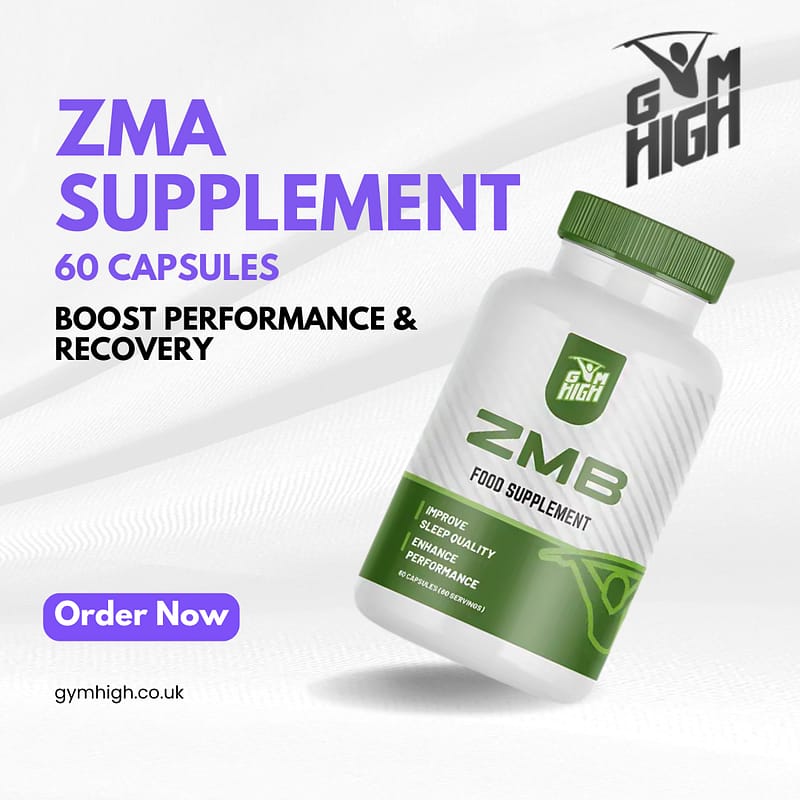ZMA Supplements: Do They Really Improve Sleep and Recovery for Athletes?
In the relentless pursuit of peak performance, athletes leave no stone unturned. From meticulous training plans to precision nutrition, every detail counts. It’s no surprise, then, that the supplement aisle is a battleground of promises. One of the most enduring and popular contenders in this arena is ZMA. But what’s the real story behind this simple-looking mineral blend?
You’ve likely heard the claims: deeper sleep, enhanced recovery, boosted testosterone, and increased strength. For any hard-training individual, this sounds like the holy grail. In this definitive guide, we’ll cut through the marketing hype, examine the science, and answer the crucial question: is a ZMA supplement UK athletes can rely on, or is it just another pill in a crowded market?
What Exactly is ZMA?
ZMA is not a brand name, but an abbreviation for a specific, patented combination of three key micronutrients:
- Zinc Monomethionine Aspartate: A highly bioavailable form of zinc.
- Magnesium Aspartate: A highly bioavailable form of magnesium.
- Vitamin B6 (as Pyridoxine Hydrochloride): Added to enhance the absorption and utilisation of both zinc and magnesium.
The magic is supposedly in the synergy and the specific forms of the minerals used. Unlike the cheaper zinc and magnesium oxides found in many multivitamins, the aspartate forms are chelated, meaning they are bound to amino acids. This process is believed to significantly improve how well your body can absorb and use them. A standard ZMA serving typically provides around 30mg of zinc, 450mg of magnesium, and 10.5mg of vitamin B6 for men (women’s doses are usually about two-thirds of this).
The Science: Why These Three Ingredients?
To understand ZMA’s potential, we need to look at the crucial roles each component plays in an athletic body.
Zinc: The Anabolic Mineral
Zinc is a powerhouse mineral involved in hundreds of enzymatic reactions. For athletes, its most important functions include:
- Hormone Regulation: Zinc is essential for the production of key anabolic hormones, including testosterone and Insulin-like Growth Factor 1 (IGF-1). Low zinc levels have been directly linked to lower testosterone.
- Protein Synthesis: You can’t build or repair muscle tissue effectively without adequate zinc. It’s a fundamental building block of recovery.
- Immune Function: Intense training can temporarily suppress the immune system. Zinc plays a vital role in keeping your immune defences strong, helping you stay healthy and consistent with your training.
Magnesium: The Relaxation and Recovery Mineral
Magnesium is arguably the star of the show when it comes to sleep and recovery. Unfortunately, it’s also a mineral in which many people, especially athletes, are deficient.
- Sleep Quality: Magnesium helps calm the nervous system by binding to GABA (gamma-aminobutyric acid) receptors, which are responsible for quieting down nerve activity. It also helps regulate the sleep hormone, melatonin. This combination can lead to a more restful, deeper sleep.
- Muscle Function: It’s critical for muscle contraction and relaxation. Adequate magnesium can help prevent muscle cramps and spasms.
- Energy Production: Magnesium is essential for the creation of ATP (adenosine triphosphate), your body’s main energy currency.
Vitamin B6: The Synergist
Vitamin B6 acts as the facilitator. Its primary role in the ZMA formula is to act as a cofactor, helping your body to efficiently absorb and make use of the zinc and magnesium. It also contributes to the production of neurotransmitters like serotonin and melatonin, further supporting the sleep-enhancing properties of the blend.
The Core Idea: Athletes lose significant amounts of zinc and magnesium through sweat. Intense exercise also increases the body’s demand for these minerals for repair and hormone production. ZMA is designed to replenish these specific minerals to prevent a deficiency that could otherwise hinder recovery, sleep, and performance.
The Big Question: Does The Evidence Back It Up?
This is where the discussion gets interesting. The initial hype around ZMA was sparked by a now-famous study from 1998, conducted by Victor Conte (the creator of the patented ZMA formula) on a group of NCAA football players. The study found that athletes taking ZMA for 8 weeks had significantly increased levels of testosterone and IGF-1, as well as greater strength gains compared to a placebo group.
However, it’s crucial to look at the bigger picture. Subsequent, independent studies have had mixed results. Several studies have failed to replicate the dramatic testosterone-boosting and strength-enhancing effects in athletes who were not deficient in zinc or magnesium to begin with.
This leads us to the most important takeaway: ZMA is not a magic muscle-builder or a steroid-like testosterone booster. Instead, its primary benefit is in correcting a deficiency.
If your zinc and magnesium levels are already optimal, taking more won’t provide a “supraphysiological” boost. But if you are an athlete who trains hard, sweats a lot, and potentially has a diet that’s not perfectly dialled in, you are at a higher risk of being deficient. In that scenario, supplementing with a quality ZMA supplement UK sourced and tested, can restore your levels to normal, thereby allowing your body to function optimally. The “gains” you experience are not from the supplement itself, but from your body finally having the tools it needs to recover properly.
ZMA and Sleep: The Most Reliable Benefit?
While the testosterone claims are conditional, the anecdotal and scientific evidence for sleep improvement is much stronger. The mechanism is clear: magnesium’s role in calming the nervous system and regulating melatonin is well-established.
Many users who start taking ZMA report a noticeable improvement in sleep quality. They often describe falling asleep faster, staying asleep longer, and experiencing deeper, more restorative sleep. A common side effect noted is more vivid and memorable dreams, which is often seen as a sign of spending more time in the REM sleep cycle—a crucial phase for mental recovery and memory consolidation.
For an athlete, better sleep is not a luxury; it’s a non-negotiable component of recovery. Improved sleep directly translates to better muscle repair, hormone regulation, and central nervous system recovery.
How to Use ZMA for the Best Results
To get the most out of your ZMA supplement, timing and what you take it with are critical.
- Timing is Everything: Take ZMA 30-60 minutes before you go to bed. This allows the magnesium to start working its magic on your nervous system, preparing you for sleep.
- On an Empty Stomach: This is the most important rule. ZMA should be taken on an empty stomach or at least 2 hours after your last meal.
- Avoid Calcium: Do not take ZMA with any calcium-containing foods or supplements (like milk, yoghurt, cheese, or a casein protein shake). Calcium competes with zinc and magnesium for absorption in the gut, and it will win, rendering your ZMA far less effective.
Choosing the Best ZMA Supplement in the UK
When you’re looking to buy a ZMA supplement in the UK, not all products are created equal. Look for:
- The Official ZMA® Formula: Look for products that are licensed and use the trademarked ZMA® logo. This ensures you’re getting the specific forms and ratios of ingredients that were used in the original research. Generic “Zinc & Magnesium” blends may use cheaper, less bioavailable forms like oxides and citrates.
- Third-Party Testing: For athletes, especially those who are tested, this is paramount. Choose brands that use third-party testing services like Informed-Sport to certify that their products are free from banned substances.
- Transparent Dosing: The label should clearly state the elemental amounts of zinc and magnesium, not just the total weight of the compounds. Look for the standard 30mg Zinc / 450mg Magnesium / 10.5mg B6 ratio for men.
The Verdict: Is ZMA Worth It?
So, do ZMA supplements really improve sleep and recovery for athletes? The answer is a qualified yes.
ZMA is not a miracle pill that will pack on muscle overnight. Think of it less as an aggressive performance-enhancer and more as a foundational insurance policy. Its true power lies in its ability to correct and prevent common mineral deficiencies that plague hard-training individuals.
By restoring zinc and magnesium to optimal levels, you are providing your body with the essential tools it needs to sleep deeply, repair damaged tissue, and regulate its hormonal environment effectively. For many athletes, the noticeable improvement in sleep quality alone makes it a worthwhile addition to their supplement stack.
If you’re training intensely, sweating regularly, and looking to optimize every aspect of your recovery, a high-quality, properly-dosed ZMA supplement is one of the most sensible and effective investments you can make in your performance.
Disclaimer: This article is for informational purposes only and does not constitute medical advice. Always consult with a healthcare professional before starting any new supplement regimen.


